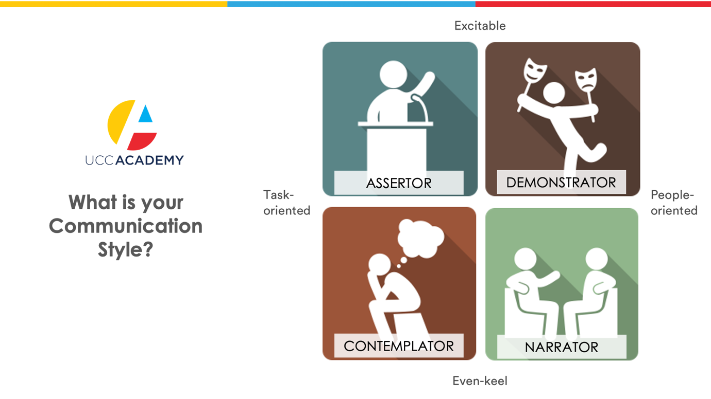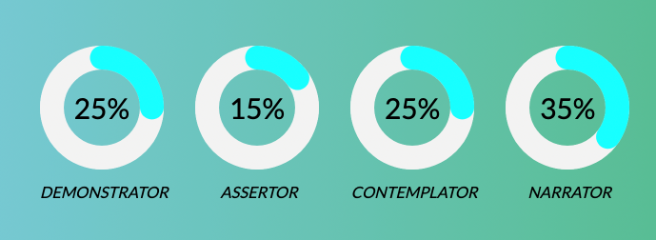3 Takeaways about Communication Styles

Given that there are so many different ways of communicating, and a corresponding number of ways of misunderstanding or misrepresenting each other, conveying our ideas, thoughts and opinions can be difficult at times.
As such, at a time when much of our professional and personal communication is delivered electronically, we need to convey information in a way that is more receptive and empathetic to the needs of others.
To gain a deeper appreciation for the communications styles preferred by individual members of the UCC Academy team, Judie Russell, Video Team Lead at UCC Academy, held a Bite-Size learning session to find out what are our own individual styles of communication.
As part of the session, Judie asked everyone to complete this online quiz to find out what is their preferred style of communication, so that we could apply a communication framework based on traits associated with being an assertor, demonstrator, contemplator or narrator.
#1 If you’re not getting results, then try a different approach
Picture this, you spend a full afternoon crafting an email that clarifies intricate details in an organised and systematic way. You press send and give yourself a pat on the back.
A couple of days go by, and you don’t receive a response. Now you’re feeling deflated and unheard. This is when you need to step back and ask yourself, ‘did I communicate in a way that the receiver prefers?’
In this example, the detailed and systematic style is perfect when you are communicating with a contemplator.
Contemplators are task-oriented, indirect and slow-paced communicators who pride themselves on their orderliness and accuracy. They appreciate detail and are likely to respond with gratitude and follow up questions.
However, if the email recipient was a demonstrator, then a more effective approach would have been a verbal conversation in a casual manner.
Demonstrators are people-oriented, fast-paced and enthusiastic individuals who prefer an informal atmosphere. Avoid expecting them to dive deep into the details with you but always follow a verbal conversation with the detailed email that they can refer back to.
They’ll appreciate your candour.
#2 We are all unique and a different blend of all four styles
While many of us will lean towards one dominant style, most of us are usually a blend of all four styles. For example, my primary style is the Narrator.
Like Contemplators, Narrators are slow-paced and indirect, but they are more people-oriented like Demonstrators. They highly value relationships over goals, are good at listening and tend to be open-minded.
The description of a Narrator resonates with me, but I can see parts of myself in the other styles also, which makes more sense when the quiz results are broken down in the image below:

The purpose of understanding styles is not to label yourself or others into opposing boxes. Instead, it is to understand that we all have a unique blend of different communication styles, and to appreciate that we must tailor our delivery based on the person we are communicating with.
#3 No one style is better or worse than any another
Suppose your goal is to one day become the company director, then you might assume that your dominant communication style will be Assertor.
Assertors are fast-paced and direct, and they are more task focussed, than people-oriented. They tend to be hard working, ambitious, leader types. They are good at making decisions quickly and efficiently. They are goal-oriented, assertive and confident. Assertors are the take-charge people who let nothing stop them.
But what if you are a narrator or a demonstrator, does it mean that you’ll never become the company director?
Not necessarily, your current style might be optimal for your current position and as you grow you may need to pivot to meet the demands of different roles or situations.
Our communication style can change over time, and the best communicators are able to adapt their style depending on their purpose and situation.
So instead of retaking the test to try and get different results, know that the exercise is less about labelling ourselves and others, and more about expanding our emotional intelligence, communicating mindfully and practicing empathy in the workplace.
UCC Academy
Contact us
UCC Academy DAC, University College Cork, Western Gateway Building 2.02, Western Road, Cork. Registered Charity Number: 20141431 ,
